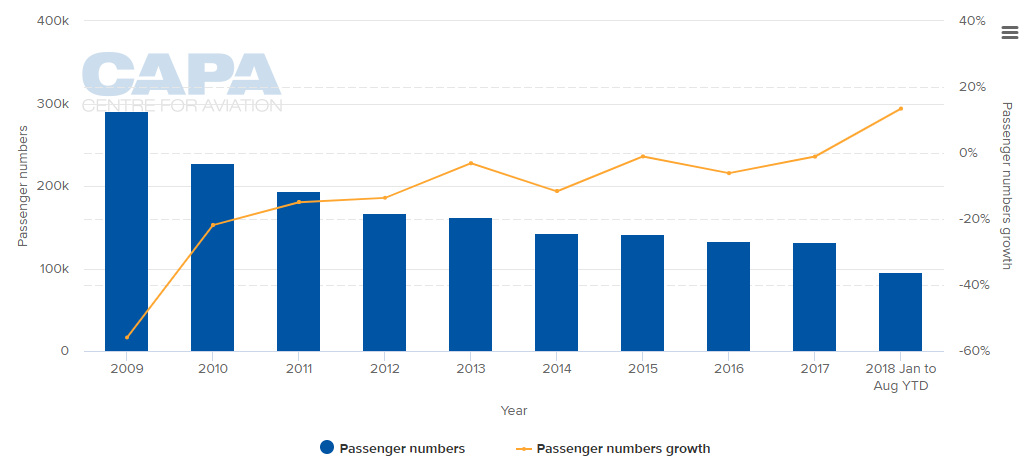Summary:
- A deal stands to be ratified by which local authorities will acquire Peel Airports' equity in Durham Tees Valley Airport in northeast England;
- A private sector operator is being lined up to take over, later, but its current owner warns that they will need to be a "wiling long-term investor" with "deep pockets";
- Durham Tees Valley Airport will be the third UK airport to return to public sector ownership after Glasgow Prestwick and Cardiff airports in Scotland and Wales.
But, with limited scheduled operations the future sustainable of the airport has been questioned of a number of occasion. Now, the Tees Valley Combined Authority has confirmed it will fund a deal to purchase the Peel Group's 89% shareholding in DTVA for GBP35 million. The authority owns the other 11%. A plot of land with planning permission for 350 homes, located next to the airport, will also be acquired for a further GBP5 million. Tees Valley Mayor Ben Houchen said the purchase will secure "the long-term future of the airport".
DTVA lies in a heavily (post-) industrial and port area of the UK in the English northeast, with one of the UK's highest unemployment rates. It has for long been an area which was not conducive to long-term planning for new air routes. A link to London Heathrow was discontinued in 2009 and was never revived. Heathrow Airport's third runway held out the prospect of government-supported routes but that still lies far in the future and an airline would have to be found to fly it, from a diminishing inventory.
Ironically it was Amsterdam, heavily promoted in the 1990s and 2000s as 'London's third airport' (after Heathrow and Gatwick) which has been DTVA's lifeline. With the charter flights gone the airport relies on two routes, Amsterdam Schiphol (KLM) and Aberdeen (Flybe), the former historically connected to the chemical industries and the latter to the oil industry.
Traffic has actually been rising in 2018, by 13.5% in the first eight months, considerably more than at most other UK airports and a reversal of the position in 2017 when primary airports in the UK regions grew much faster than the comparative minnows.
CHART - A decade of year-on-year traffic declines will end in 2018 with demand up +13.5% in the first eight months of the year Source: CAPA - Centre for Aviation and UK Civil Aviation Authority
Source: CAPA - Centre for Aviation and UK Civil Aviation Authority
Nevertheless that growth has come too late for the Manchester-based Peel Airports, which originally bought 75% of DTVA for GBP500,000 in 2003, having hoped to replicate its early success at Liverpool John Lennon Airport. At its peak (2006) DTVA was handling almost one million passengers annually but the 131,000 (-1.1%) in 2017 is barely sustainable while Peel claims to have spent over GBP40 million on infrastructure projects.
Earlier this year the Tees Valley Combined Authority outlined its strategic vision for 2018 in which it included presenting a proposal to the owners Peel Airports to bring Durham Tees Valley Airport back into public ownership. It had become known that Peel could shut the airport if it could demonstrate the site is "no longer economically viable".
This was the proposal which became a formal one on 04-Dec-2018, in effect bringing it back into public ownership, although it is understood that another, unnamed operator/investor has been identified to take over Peel's activities in the long run. Robert Hough, chairman of Peel Airports, has commented that the deal offers "a new beginning" for the airport while adding "deep pockets" would be needed with a "wiling long-term investor" with a plan to provide support.
The deal, which is not yet legally binding, is subject to ratification from the leaders of the five local authorities that make up the Tees Valley Combined Authority, who will vote on it in Jan-2019 at an emergency meeting called by the Mayor.
Few obvious investors/operators come to mind to take over Peel's role, apart from the Rigby Group, a conglomerate which acquired Bournemouth Airport from MAG in Dec-2017 and which specialises in secondary and tertiary level airports which have business parks attached, or which could have. Its portfolio as owner or operator also includes Coventry, Exeter, Norwich, Blackpool and City of Derry airports.
If and when DTVA returns wholly to the public sector (and for how long) it will join Cardiff and Glasgow Prestwick airports, which were acquired by the Welsh and Scottish governments respectively in 2013 from the private sector and have not yet returned to it despite that being the intention.